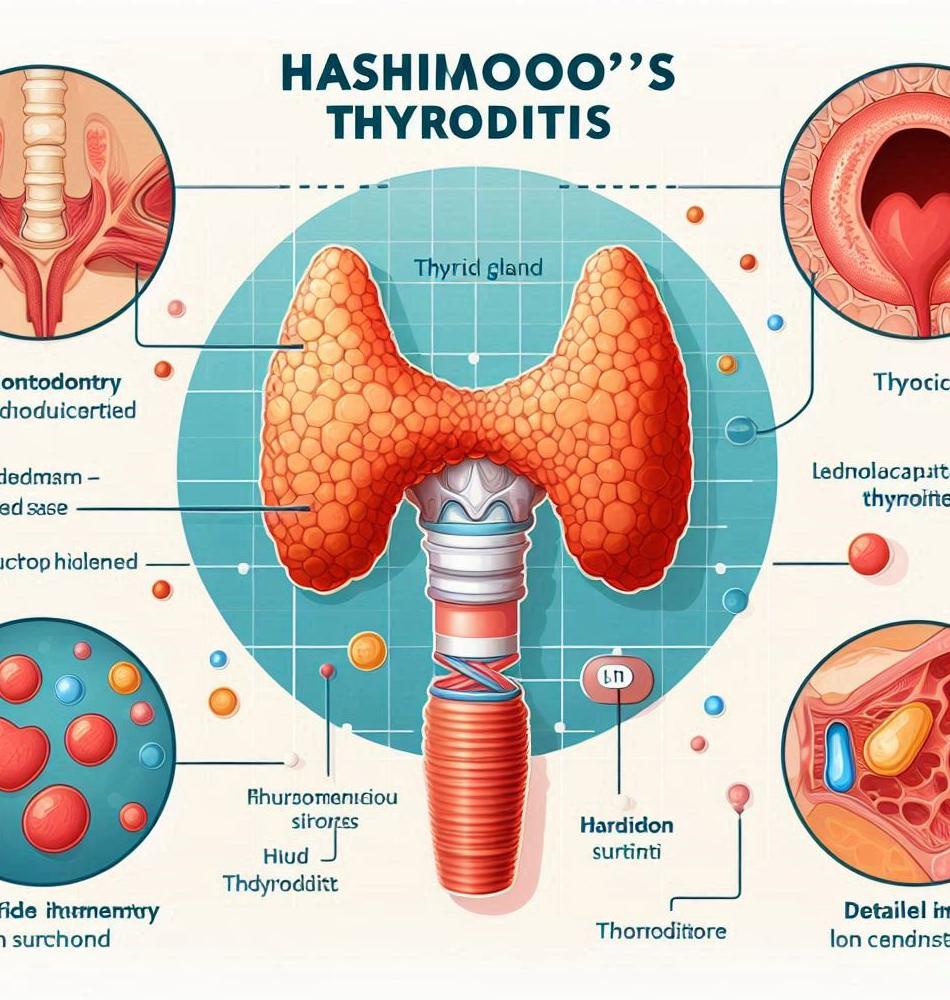Unmasking Hashimoto's Disease: Causes, Symptoms, and Management 🧩
Hashimoto's disease is a perplexing condition that seems to arise unexpectedly, targeting the thyroid gland. This autoimmune disorder often leaves individuals scratching their heads, wondering what triggered this attack on their body. Understanding the intricacies of Hashimoto's disease can empower those affected to take control of their health. In this article, we will delve into the causes, symptoms, and management options that can make a difference.
What is Hashimoto's Disease? 🌟
Before we dive into the causes, let’s clarify what Hashimoto's disease actually is. Named after the Japanese physician who first described it in 1912, Hashimoto's disease involves an autoimmune reaction that slowly destroys the thyroid gland. As the thyroid struggles to produce hormones effectively, countless bodily functions can become disrupted, leading to a cascade of symptoms.
Understanding the Causes of Hashimoto's Disease 🔍
1. Autoimmune Response ⚡
At the core of Hashimoto's disease is an autoimmune response. So, what exactly does this mean? Essentially, the immune system mistakenly identifies thyroid cells as foreign invaders and begins to attack them. This can lead to chronic inflammation and thyroid damage, ultimately resulting in a decreased hormone production. But why does the immune system go haywire?
Genetics and Family History 🧬
Your genetic makeup plays a crucial role in determining your susceptibility to Hashimoto's disease. If someone in your family has autoimmune disorders, your risk may heighten. Specific genes have been associated with autoimmune conditions, hinting that inheritance may lead to similar outcomes in other family members.
Environmental Triggers 🌍
Environmental factors may also play a hand in the onset of Hashimoto's disease. Here are a few potential triggers:
- Infections: Viral or bacterial infections could set off an immune response that targets the thyroid.
- Medications: Certain drugs, like lithium and interferon, can potentially spark the onset.
- Radiation Exposure: Those exposed to radiation or undergoing radiation therapy may be at increased risk.
2. Hormonal Factors 🏵️
Interestingly, Hashimoto's disease is more prevalent in women than men, particularly during hormonal changes like pregnancy or menopause. This prompts questions about the role hormones play in the development of Hashimoto's. Changes in estrogen and progesterone can influence immune function, possibly contributing to thyroid dysfunction.
3. Nutritional Deficiencies 🍽️
Some nutritional deficiencies may also cause or exacerbate Hashimoto's disease. A diet lacking in vital nutrients can severely impact thyroid health. Consider the following nutrients:
- Selenium: This mineral is crucial for thyroid hormone production.
- Iodine: While iodine is essential, too much or too little can trigger thyroid issues.
- Vitamin D: Low levels of vitamin D have been linked to increased autoimmune responses.
Recognizing the Symptoms of Hashimoto's Disease 🚨
Symptoms of Hashimoto's disease can be diverse and sometimes subtle. Many patients might not even realize that their symptoms stem from thyroid dysfunction. Here’s a list of potential symptoms to look out for:
- Fatigue: A profound and inexplicable tiredness that doesn’t improve with rest.
- Weight Gain: Unexplained weight gain or difficulty losing weight.
- Cold Intolerance: Increased sensitivity to cold temperatures.
- Hair Changes: Thinning hair or hair loss.
- Depression: Feelings of sadness and hopelessness that seem unrelated to external circumstances.
Frequently Asked Questions About Hashimoto's Disease ❓
- What lab tests are used to diagnose Hashimoto's disease?
- Is there a cure for Hashimoto's disease?
- Can lifestyle changes help manage symptoms?
- Are there any specific diets recommended for Hashimoto's disease?
- How can one differentiate between Hashimoto's and other thyroid disorders?
Management Strategies for Hashimoto's Disease 💡
Living with Hashimoto's disease requires a multi-faceted approach. While a cure remains elusive, effective management strategies can help control symptoms and improve quality of life. Consider the following methods:
1. Thyroid Hormone Replacement Therapy 💊
Many individuals with Hashimoto's require thyroid hormone replacement therapy to counteract low hormone levels. Levothyroxine is a common medication that mimics the hormones normally produced by the thyroid. Regular monitoring and dosage adjustments are essential to maintain optimal hormone levels.
2. Dietary Adjustments 🍏
While no one-size-fits-all diet exists for Hashimoto's disease, some individuals may benefit from dietary modifications. Consider the following:
- Gluten-Free Diet: Some patients find relief by eliminating gluten.
- Increased Antioxidants: Foods rich in antioxidants can combat inflammation.
- Avoiding Processed Foods: Reducing processed foods may improve overall wellness.
3. Regular Monitoring and Follow-up 📝
Consistent follow-up with healthcare providers is vital for managing Hashimoto's disease. Regular blood tests are necessary to monitor thyroid hormone levels and adjust medication as needed. Keeping abreast of developments is essential for long-term health.
Conclusion: Taking Charge of Hashimoto's Disease 🚀
Hashimoto's disease is a multifaceted autoimmune condition that can throw a wrench in daily life. Understanding its causes, symptoms, and management strategies can empower individuals grappling with this disease. By taking charge of their health and seeking appropriate care, those with Hashimoto's disease can lead fulfilling lives despite the challenges they may face.
Whether it is through dietary changes, medication, or regular check-ups with healthcare professionals, a proactive approach is critical. The journey may be complex, but with the right tools and knowledge, individuals can find their path to wellness.
.png)






